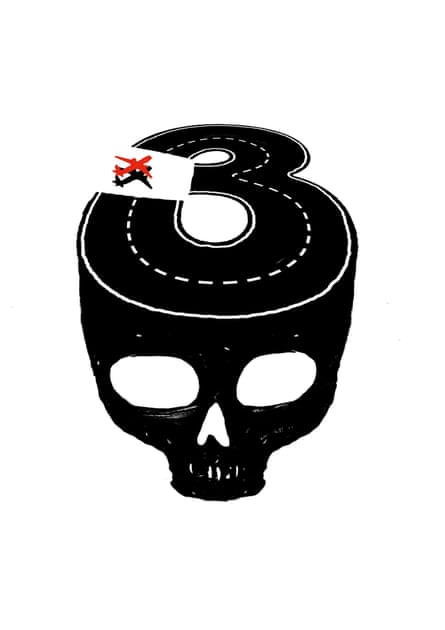In the middle of a week of record temperatures, as if unaware of the irony, the business community celebrated the consolidation of its attempts to force the government’s hand to agree to a third filth-generating runway at Heathrow, tipping all species on Earth towards extinction. Everything will die soon, except for cockroaches, and Glastonbury favourite the Fall, who will survive even a nuclear holocaust, though they will still refuse to play their 80s chart hits.
In Norfolk on Thursday, the tarmac melted, and ducklings became trapped in sticky blackness. When a lioness whelped in an ancient Roman street, Caesar thought something was up. Here, solid matter transmuted to hot liquid and swallowed baby birds whole. How surreal do the signs and warnings have to become before we stop in our tracks? Are whales required to fall from the sky? Does Tim Henman have to give birth to a two-headed cat on Centre Court?
CBI director John Cridland says: “The government must commit to the decision now, and get diggers in the ground at Heathrow swiftly by 2020.” Head of the Institute of Directors Simon Walker says: “There can now be no further delay from politicians.” And Segro chief executive David Sleath merely bellows: “Get on with it!”, like some selfish Top Gear presenter demanding his steak dinner after dawdling, the planet itself the powerless BBC employee he punches in the face.
The business community has thrown its executive toys out of the pram, and now there are chrome ball bearings on strings everywhere, tripping up unpaid interns and making life difficult for immigrant cleaners scrabbling under desks on less than minimum wage. David Cameron, an electoral promise to oppose the third runway sticking in his throat like an undigested salmon bone, can only duck his cowardly head and hope some terrible atrocity or a Wimbledon win wafts our attention away.
When I was a child, my grandmother always referred to our pet dog’s excrement as “business”, so to this day, when I envisage “the business community”, I imagine a vast pile of sentient faeces issuing its demands while smoking a Cuban cigar, an image that seems increasing accurate as the decades pass.
The destruction of all life on Earth is inevitable if fossil fuel use continues unabated. (Legal. Please advise. Are we allowed to say this now without being shouted down by Nigel Lawson?) The business community’s genius move in the third runway debate has been to change the dialogue from an argument which should have been between building a runway and not building a runway at all, and trying to restructure our society to avoid the need for a third runway, into an argument about where exactly it was best to position this massive portent of our world’s forthcoming doom. It’s like offering an innocent man who doesn’t want to be hanged the chance to be poisoned instead.
As with fracking and the academification of all schools, decisions have already been made behind closed doors by forces beyond our control. Heathrow’s third runway will happen. Assurances about air quality are meaningless. The UK has already been threatened with £300m a year fines by those meddling Brussels bureaucrats for our terrible British air, and Boris’s solution in London was to spray adhesive around the city by night to try and stick the pesky pollution particles to the pavement, like a lazy duplicitous boy pushing his mess under his bed rather than tidying up his room.

And in 50 years, will there be anyone left to remember what it was like before a sterile and toxic environment gradually became the norm? Can it only be four decades ago that every summer holiday trek along A-roads to South Devon caravan sites left our Morris Marina windscreen smeared thick with now-disappeared invertebrates, that sparrows swarmed around morning milk bottles, that sticklebacks and minnows spawned in every park pond, that hedgehogs gathered at night in suburban gardens and lay flattened in their thousands on roads every morning, and that an actual hare ran out of the encroached common land of Palmers Rough, on the fringes of Birmingham, to be chased by my grandfather along Arnold Road in that same Morris Marina, a sight that would seem as surreal today as escaped hippos wandering the streets of some collapsed eastern European capital?
The absence of abundance is already accepted. The metaphors of the nature poets, mapping human hearts through once commonly understood imagery, are irrelevant and impenetrable. “The sun of Winter, / The moon of Summer, and all the singing birds / Except the missel-thrush that loves juniper, / Are quite shut out.” I’m sorry. The missel-what? Can the juniper be monetised? Is this missel-thing for sale? Our children already have no stable baseline from which to calibrate the loss of all that lives. It’s game over.
Bearing this in mind, I finally find myself reluctantly agreeing with the business community. There is no time for delay. Let’s build the runway. Let’s choke the Earth. Let’s get this damn thing over with, for what can be avoided, whose end is purposed by the mighty gods of business? Hasten our demise, let our children be the last of their sorry line, and spare their unborn descendants any further suffering. We will not save the rhino. We will not even save the hedgehog. How can we save the world?
But, if you can purge cheap sentiment from your mind, how exciting and fascinating it will be to watch as the world becomes uninhabitable. It’s almost worth going on a health kick to survive another 60 years and see everything immolated. How many humans have had the awe-inspiring opportunity to witness such spectacle: the end of all that is?
But something of us should be preserved, I think, for posterity. Perhaps the village of Harmondsworth and its residents, instead of being demolished and paid off at 125% of their homes’ market values, should be sealed within a vast dome and shot spacewards, to drift on the solar winds as a museum of mankind, saving something of our society at the point where it finally became unsustainable.
Under a vast skein of convex glass Harmondsworth floats beyond Orion’s Belt, its ancient tithe barn, Betjeman’s “cathedral of Middlesex”, still and safe under the stars; local resident Graham Wibrew, his once imperilled kitchen extension complete, watches the comets and thinks of home; and the bells of 11th century St Mary’s toll the eternal hours silently in endless empty space. “But far more ancient and dark / The Combe looks since they killed the badger there, / Dug him out and gave him to the hounds, / That most ancient Briton of English beasts.” Edward Thomas, The Combe.
Stewart Lee’s A Room With a Stew is playing at the Assembly Rooms, Edinburgh, 18-30 August and Leicester Square theatre, London, 21 September to 8 January 2016
